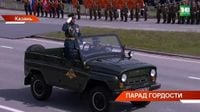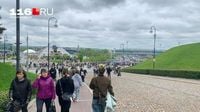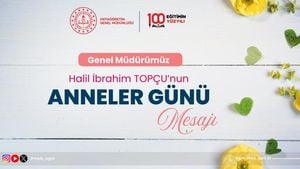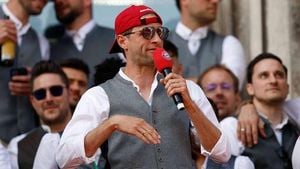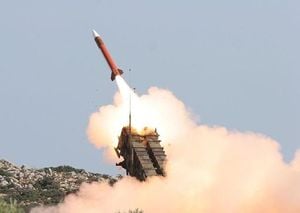On May 9, 2025, Kazan celebrated the 80th anniversary of Victory in the Great Patriotic War with a series of grand events throughout the city. The day began with solemn ceremonies, including the laying of flowers and garlands at military memorials, honoring the sacrifices made during the war. This commemoration was not just a public holiday; it resonated deeply with families, reminding them of the personal stories intertwined with the national narrative of victory.
The highlight of the day was the Victory Parade, which commenced at 10:00 AM on Tysyacheletiya Square. Despite heightened security measures, residents managed to pass through metal detectors without significant delays, allowing the festivities to proceed smoothly. The city center had been cordoned off, making taxis unavailable, but the determination of the citizens to participate was evident.
During the parade, 32 units marched past, including professional military personnel, student groups, young soldiers, and special units. The iconic T-34 tank led the procession, followed closely by the modern T-90M "Breakthrough" tank, symbolizing the continuity of military strength and heritage. Azat Abzalov, the head of Kazan's cultural committee, noted an increase in participants this year, reflecting a growing enthusiasm for the event.
Among the crowd, the appearance of the legendary "Katyusha" rocket launcher and the T-34 "Kolkhoznik of Tatarstan" stirred emotions, serving as powerful symbols of the indomitable spirit of the Soviet Army. The atmosphere was charged with pride and remembrance as the parade showcased not only historical vehicles but also contemporary military technology.
Post-parade, Tysyacheletiya Square transformed into a vibrant stage for a series of performances. Throughout the morning, 14 choreographic groups and a choir of over a thousand voices captivated the audience with songs from the war years, encapsulating the essence of the celebrations. As the day progressed, preparations began for the evening program, which featured the anniversary edition of "Singing Kazan," a popular project celebrating its tenth year in the format of "People's Karaoke." Despite the absence of famous headliners, the organizers promised that the city itself would be the star of the show.
One of the most poignant moments of the day was the return of the "Immortal Regiment" procession, which resumed after a hiatus due to safety measures. Starting at 3:00 PM, participants carried photographs of their ancestors who fought in the war, creating a moving tribute to those who had served. Entry points for the procession opened at noon, allowing families to gather and share stories of their loved ones.
Meanwhile, on Bauman Street, a historical reenactment of the celebrations from May 9, 1945, took place at 2:00 PM. This project recreated the jubilant atmosphere of the immediate post-war period, featuring actors in military uniforms, dancing, and brass bands, all contributing to a nostalgic reflection of a momentous occasion in history. Abzalov emphasized the effort to capture the essence of that time, filled with joy and relief.
In Victory Park, from noon onward, families enjoyed master classes, a brass band festival, and festive trade, reminiscent of a lively weekend market. The park was bustling with children waving flags, elderly couples enjoying the music, and the tantalizing smell of corn dogs wafting through the air. Prices for treats on Tysyacheletiya Square included popcorn for 200-300 rubles, sweet cotton candy for 200 rubles, and hotdogs for 300 rubles, among other festive offerings.
However, the day was not without its challenges. Residents reported significant traffic congestion on major streets, including Tashaak, Karl Marx, and Korotchenko, as the city center was closed to vehicle traffic. Organizers had advised attendees to arrive early to avoid delays at the checkpoints, where metal detectors were set up. Despite these precautions, many reported that security checks were not as stringent as expected, allowing for a smoother flow into the events.
Additionally, connectivity issues plagued the city, with residents expressing frustration over intermittent mobile internet service. Complaints surfaced about difficulties in sharing photos and updates from the festivities, with one resident lamenting, "The internet works intermittently, messages are sent through once. I can't send photos from the parade, it's awful!" Another noted, "Everything is dead, the internet is lagging. Pictures aren't loading. Nothing loaded for about 20 minutes." Despite these technological hiccups, the spirit of celebration remained high.
The grand finale of the day was scheduled for 10:00 PM, with a spectacular fireworks display over Kazanka River. The six-minute show promised to illuminate the night sky in honor of the 80th anniversary of Victory, with spectators encouraged to find vantage points along the waterfront for the best view. Rustam Minnikhanov, the head of the Republic of Tatarstan, addressed the crowd, stating, "The spring of 1945 showed the whole world: it is impossible to break us! Low bow to the veterans, eternal glory to the heroes…" This powerful message resonated with attendees, encapsulating the pride and resilience felt throughout the celebrations.
As the day drew to a close, Kazan's Victory Day festivities reflected a deep sense of community, remembrance, and national pride. The events not only honored the past but also united generations in celebrating the enduring legacy of those who fought for their country. Despite the challenges faced, the spirit of Victory Day shone brightly in Kazan, leaving lasting memories for all who participated.
